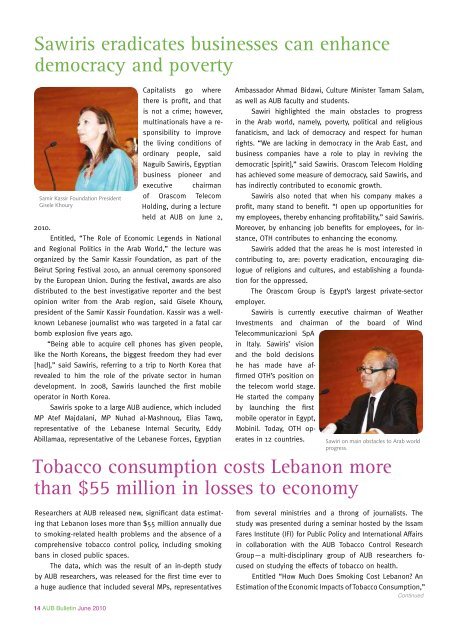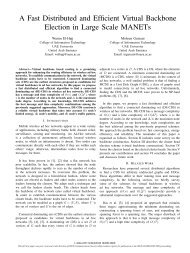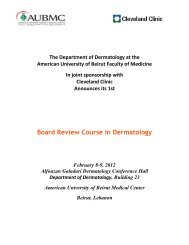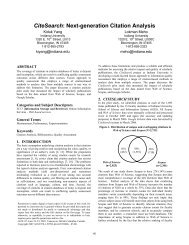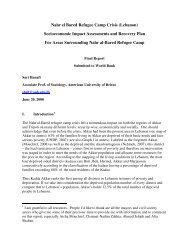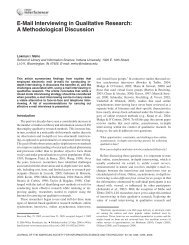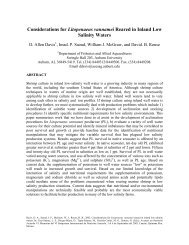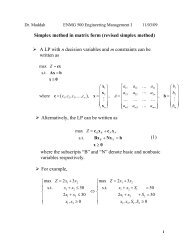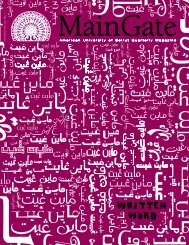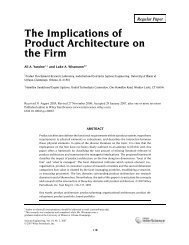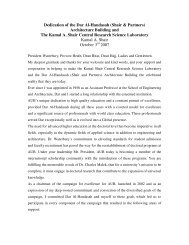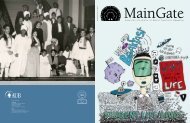Bulletin - American University of Beirut
Bulletin - American University of Beirut
Bulletin - American University of Beirut
You also want an ePaper? Increase the reach of your titles
YUMPU automatically turns print PDFs into web optimized ePapers that Google loves.
Sawiris eradicates businesses can enhance<br />
democracy and poverty<br />
Samir Kassir Foundation President<br />
Gisele Khoury<br />
Capitalists go where<br />
there is pr<strong>of</strong>it, and that<br />
is not a crime; however,<br />
multinationals have a responsibility<br />
to improve<br />
the living conditions <strong>of</strong><br />
ordinary people, said<br />
Naguib Sawiris, Egyptian<br />
business pioneer and<br />
executive chairman<br />
<strong>of</strong> Orascom Telecom<br />
Holding, during a lecture<br />
held at AUB on June 2,<br />
2010.<br />
Entitled, “The Role <strong>of</strong> Economic Legends in National<br />
and Regional Politics in the Arab World,” the lecture was<br />
organized by the Samir Kassir Foundation, as part <strong>of</strong> the<br />
<strong>Beirut</strong> Spring Festival 2010, an annual ceremony sponsored<br />
by the European Union. During the festival, awards are also<br />
distributed to the best investigative reporter and the best<br />
opinion writer from the Arab region, said Gisele Khoury,<br />
president <strong>of</strong> the Samir Kassir Foundation. Kassir was a wellknown<br />
Lebanese journalist who was targeted in a fatal car<br />
bomb explosion five years ago.<br />
“Being able to acquire cell phones has given people,<br />
like the North Koreans, the biggest freedom they had ever<br />
[had],” said Sawiris, referring to a trip to North Korea that<br />
revealed to him the role <strong>of</strong> the private sector in human<br />
development. In 2008, Sawiris launched the first mobile<br />
operator in North Korea.<br />
Sawiris spoke to a large AUB audience, which included<br />
MP Atef Majdalani, MP Nuhad al-Mashnouq, Elias Tawq,<br />
representative <strong>of</strong> the Lebanese Internal Security, Eddy<br />
Abillamaa, representative <strong>of</strong> the Lebanese Forces, Egyptian<br />
Ambassador Ahmad Bidawi, Culture Minister Tamam Salam,<br />
as well as AUB faculty and students.<br />
Sawiri highlighted the main obstacles to progress<br />
in the Arab world, namely, poverty, political and religious<br />
fanaticism, and lack <strong>of</strong> democracy and respect for human<br />
rights. “We are lacking in democracy in the Arab East, and<br />
business companies have a role to play in reviving the<br />
democratic [spirit],” said Sawiris. Orascom Telecom Holding<br />
has achieved some measure <strong>of</strong> democracy, said Sawiris, and<br />
has indirectly contributed to economic growth.<br />
Sawiris also noted that when his company makes a<br />
pr<strong>of</strong>it, many stand to benefit. “I open up opportunities for<br />
my employees, thereby enhancing pr<strong>of</strong>itability,” said Sawiris.<br />
Moreover, by enhancing job benefits for employees, for instance,<br />
OTH contributes to enhancing the economy.<br />
Sawiris added that the areas he is most interested in<br />
contributing to, are: poverty eradication, encouraging dialogue<br />
<strong>of</strong> religions and cultures, and establishing a foundation<br />
for the oppressed.<br />
The Orascom Group is Egypt’s largest private-sector<br />
employer.<br />
Sawiris is currently executive chairman <strong>of</strong> Weather<br />
Investments and chairman <strong>of</strong> the board <strong>of</strong> Wind<br />
Telecommunicazioni SpA<br />
in Italy. Sawiris’ vision<br />
and the bold decisions<br />
he has made have affirmed<br />
OTH’s position on<br />
the telecom world stage.<br />
He started the company<br />
by launching the first<br />
mobile operator in Egypt,<br />
Mobinil. Today, OTH operates<br />
in 12 countries.<br />
Tobacco consumption costs Lebanon more<br />
than $55 million in losses to economy<br />
Researchers at AUB released new, significant data estimating<br />
that Lebanon loses more than $55 million annually due<br />
to smoking-related health problems and the absence <strong>of</strong> a<br />
comprehensive tobacco control policy, including smoking<br />
bans in closed public spaces.<br />
The data, which was the result <strong>of</strong> an in-depth study<br />
by AUB researchers, was released for the first time ever to<br />
a huge audience that included several MPs, representatives<br />
Sawiri on main obstacles to Arab world<br />
progress.<br />
from several ministries and a throng <strong>of</strong> journalists. The<br />
study was presented during a seminar hosted by the Issam<br />
Fares Institute (IFI) for Public Policy and International Affairs<br />
in collaboration with the AUB Tobacco Control Research<br />
Group—a multi-disciplinary group <strong>of</strong> AUB researchers focused<br />
on studying the effects <strong>of</strong> tobacco on health.<br />
Entitled “How Much Does Smoking Cost Lebanon An<br />
Estimation <strong>of</strong> the Economic Impacts <strong>of</strong> Tobacco Consumption,”<br />
Continued<br />
the seminar took place in College Hall’s Auditorium B1 on<br />
May 4, 2010, and was attended by many, including Provost<br />
Ahmad Dallal and MPs Tammam Slam, Atef Majdalani, and<br />
Walid Al-Khoury, in addition to Mazen Soueid, an adviser for<br />
former Premier Fuad Siniora.<br />
Representatives <strong>of</strong> the Ministries <strong>of</strong> Economy, Health<br />
and Finance and a representative from the International<br />
Monetary Fund also attended the seminar.<br />
With Lebanon having one <strong>of</strong> the highest smoking rates<br />
in the world, and given the current political climate <strong>of</strong> stalling<br />
and dilly-dallying when it comes to passing tobacco<br />
control policies, this IFI-funded research paper, written by<br />
AUB’s assistant pr<strong>of</strong>essors Jad Chaaban and Nisreen Salti<br />
as well as researcher Nadia Naamani, has given impetus for<br />
informed decision-making.<br />
Panelist Chaaban summarized the key findings <strong>of</strong> the<br />
report, showing how current tobacco consumption patterns<br />
lead to a loss <strong>of</strong> more than $55.4 million every year, excluding<br />
the effects <strong>of</strong> nargileh smoking, passive smoking,<br />
and other smoking-related diseases. Currently, more than<br />
3,500 Lebanese die annually because <strong>of</strong> smoking-related<br />
diseases.<br />
In order to tally net revenues and total costs, researchers<br />
took into consideration several stakeholders <strong>of</strong> the tobacco<br />
sector. These included the 24,000 registered tobacco farmers<br />
(<strong>of</strong> which 40 percent rely on other non-tobacco sources<br />
<strong>of</strong> revenue) tobacco-market regulators, tobacco companies,<br />
distributors, the government, and finally consumers.<br />
The study found that local net revenues amount to<br />
$271.3 million annually, while total costs-including direct<br />
and indirect costs- are estimated at $326.7 million annually.<br />
Farouk W. Agha Engineering<br />
Excellence Award established<br />
The <strong>American</strong> <strong>University</strong> <strong>of</strong> <strong>Beirut</strong> and its Faculty <strong>of</strong><br />
Engineering and Architecture have announced the establishment<br />
<strong>of</strong> the Farouk W. Agha Engineering Excellence<br />
Award. The award will be bestowed annually to a graduating<br />
engineering student majoring in either mechanical or<br />
civil engineering.<br />
In establishing the award, Nahed Agha Salam lauded<br />
her father Abdullatif, “who raised me meticulously,” and her<br />
uncle, Farouk, who made it possible for her to earn a master’s<br />
degree in computer engineering from Imperial College<br />
in London. She went on to explain that both men shared<br />
a deep appreciation for the important role that a university<br />
education—especially at an institution <strong>of</strong> the “caliber <strong>of</strong><br />
AUB”—plays in the development <strong>of</strong> countries and in an individual’s<br />
life as well. Nahed Salam also dedicated the award<br />
to all civil and mechanical engineers including her sons: Hadi,<br />
Left to right: Provost Ahmad Dallal, IFI Director Khouri, Dr. Rima Nakkash,<br />
and Dr. Jad Chaaban.<br />
Direct costs are due to smoking-related diseases, loss <strong>of</strong><br />
productivity or work inefficiency, and environmental degradation<br />
through forest fires or street littering, for example.<br />
Indirect costs are related to pre-mature mortality.<br />
The seminar concluded with several policy recommendations:<br />
higher taxes on tobacco products, bigger health<br />
warnings on tobacco packs, smoking bans in public areas,<br />
bans on tobacco advertising, tax incentives for smoke-free<br />
restaurants, increased research and awareness on the subject,<br />
providing financing facilities and cash to families in<br />
rural areas, and giving no grace period for the new law.<br />
The general mood <strong>of</strong> the room was all in favor <strong>of</strong> the<br />
controls, and assistant pr<strong>of</strong>essor and panelist Rima Nakkash<br />
suggested additional future meetings with supporting<br />
parliamentary members. Rania Baroud, the vice-president<br />
<strong>of</strong> the Tobacco-Free Initiative, assured policy-makers their<br />
popularity need not be in jeopardy should they pass any<br />
tobacco control laws; in fact such a move may serve them<br />
well because “sixty-five percent <strong>of</strong> Lebanese people are<br />
non-smokers,” she said.<br />
who graduated with<br />
a BE in mechanical<br />
engineering in 2006,<br />
and Amir, who will<br />
be graduating in June<br />
2010 with a BE in civil<br />
engineering.<br />
From left to right: Walid Katergi, Nahed Agha<br />
Salam, Dean Hajj, Hadi Salam, and Imad<br />
Baalbaki.<br />
Farouk Agha started his college education as an FEA<br />
student at AUB. He was awarded a Fulbright Scholarship to<br />
continue his studies at the <strong>University</strong> <strong>of</strong> California, Berkeley.<br />
After graduation, he moved to the Gulf region where he<br />
founded a large contracting firm and an industrial group<br />
there. He is one <strong>of</strong> the founders <strong>of</strong> the Center for Lebanese<br />
Studies, which is associated with Oxford <strong>University</strong> in<br />
London.<br />
14 AUB <strong>Bulletin</strong> June 2010 AUB <strong>Bulletin</strong> June 2010 15


